How to Choose a Guitar: Acoustic, Classical, or Electric?
Choosing a guitar can be a difficult task, especially for a guitar beginner, because there are so many options! I hope to present you with a full set of information so that you can be confident that you are making the best choice of guitar for you. It is important to have the right guitar before you start taking your guitar lessons.
While each type of guitar has many variations, there are only three general types of guitar. There are acoustic guitars, classical guitars, and electric guitars. Each of these guitar types has advantages and disadvantages in the styles of music they are best suited for, and their physical playability.
Acoustic guitars produce sound by physically vibrating strings made of steel, or some other metals, that are tied to a resonating box. Classical guitars do the same thing, but with nylon strings, or by silk or gut strings in very old guitars. Despite having many similar appearances, the bracing, fretboard length and width, materials, and other things are quite different. Their sound is also very different.
But the classical and acoustic guitar are much more similar than the electric guitar. Electric guitars do not produce sound acoustically like the acoustic and classical guitars. They use electromagnetic pickups to turn the movements of the strings into electrical signals, which must be amplified to be easily heard.
I will recommend that before you choose a guitar type, you should first decide upon the style or styles of music that you most want to play. There is no reason to start with an acoustic guitar if you really want to play blues or jazz which typically require an electric guitar.
Choosing a guitar
Consider what kind of music you want to play and your
1. Choosing by musical style.
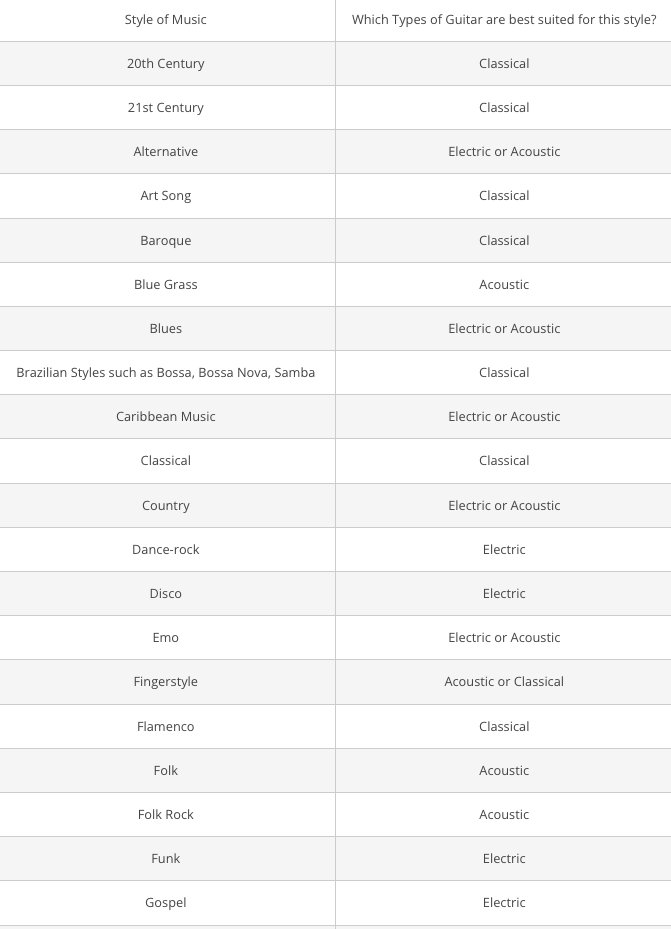
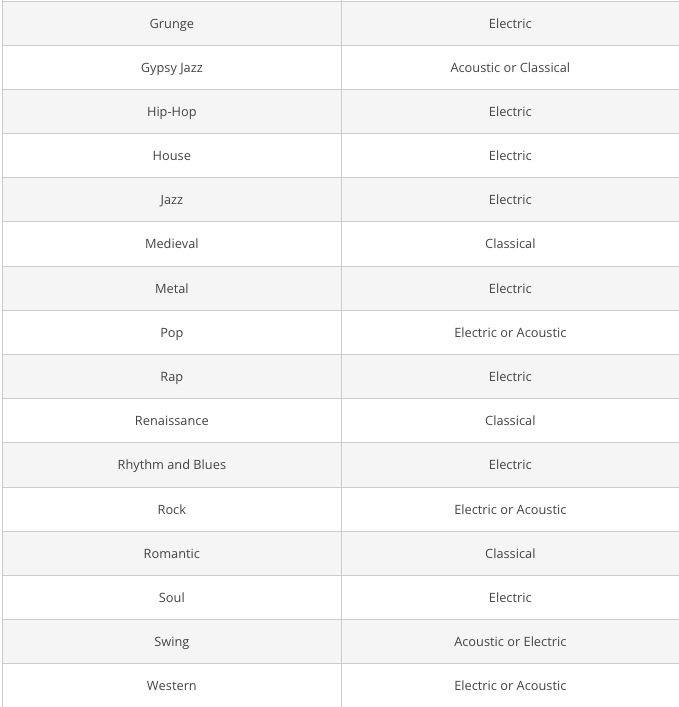
The chart above shows you the type of guitars best suited for the style of music you want to play. Simply read the chart and find the style of music that you wish to play on the left, and then find the type(s) of guitars used for that style. However, you could play any style of music on any guitar if you really wanted to, but the sound may not be the best fit for the style.
2. Choose by multiple music styles.
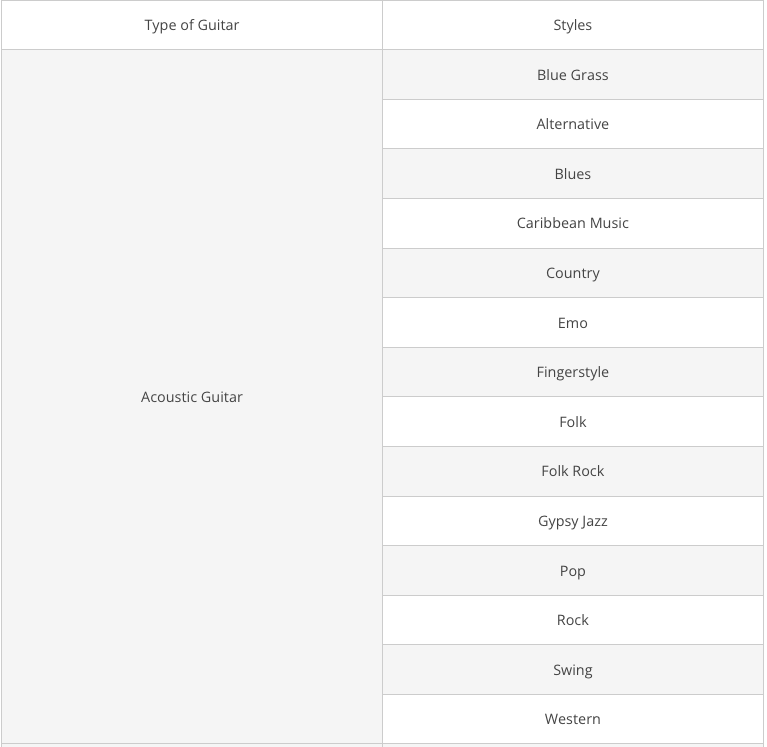
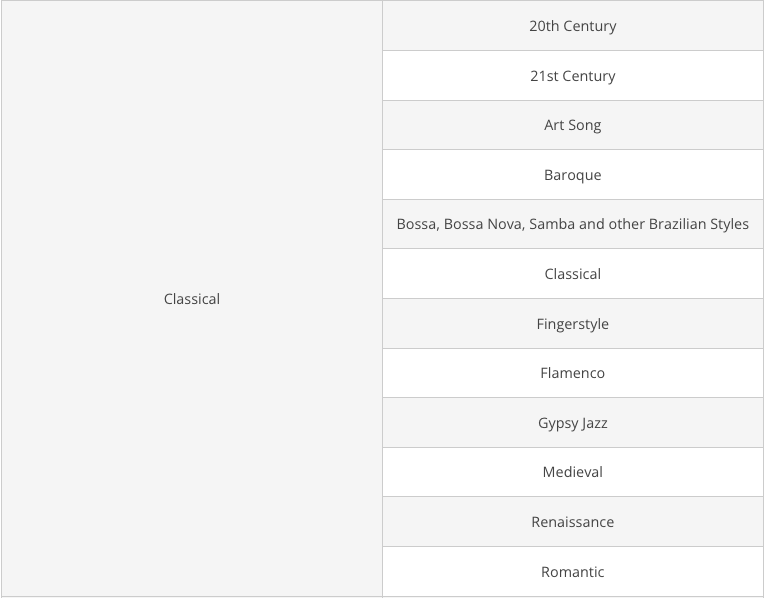
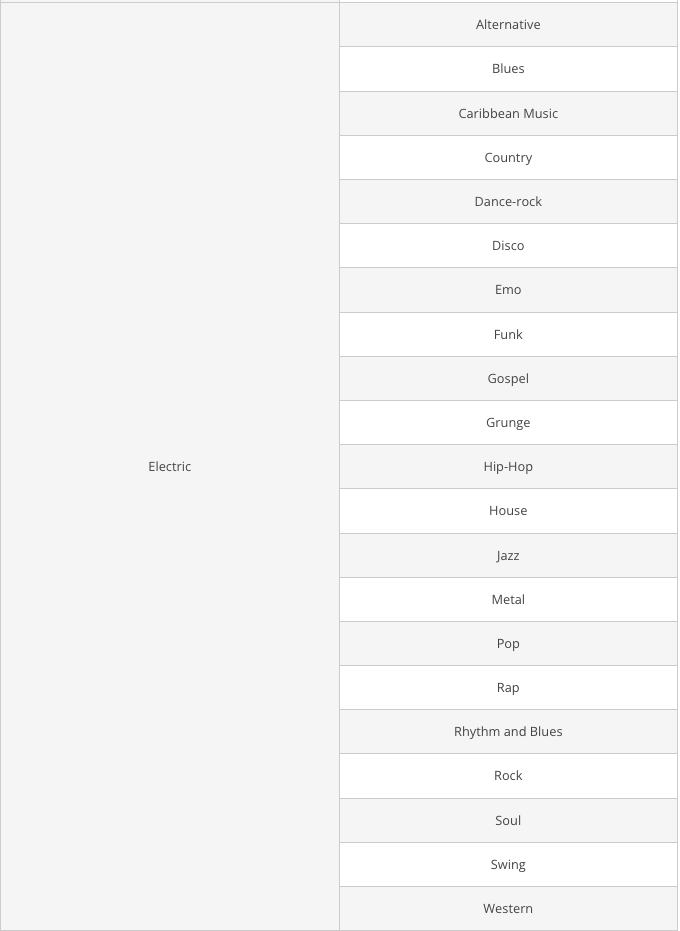
In case you are interested in multiple styles, you can use this chart to find all of the styles each type of guitar is typically used to play. If you are like most people, you are probably interested in more than one style of music. If that is the case, then it may be best to choose your guitar by selecting the one that gives you the ability to play all or most of the styles that interest you.
3. Choosing a guitar by physical considerations.
While I recommend that you choose your guitar based upon the styles of music that interest you, there may be situations where I would recommend you choose a guitar based upon the physical playability of the instrument. The two most common situations include children, and people with injuries or disabilities.
Young children might not have the hand strength to depress the strings of an acoustic guitar, or to wear a heavy electric guitar without severe discomfort or fatigue. I would likely recommend a classical guitar to young children.
People with disabilities or injuries might choose one guitar over another depending upon their situation. For example, I would not recommend someone with a left shoulder or upper back injury carry the weight of the electric guitar on a strap, so I would recommend either an acoustic or a classical. Or, I wouldn’t recommend someone with a rotator cuff injury to use a deep body acoustic guitar because the stress that is put on the right shoulder. In that case I would recommend an electric guitar, which is comparatively thin and less likely to aggravate such an injury.
The acoustic guitar's advantages and disadvantages
Advantages
- It is well suited for playing melodies and chords.
- The narrow neck makes playing scales and chords relatively easy.
- The close string spacing makes playing scales or chords with a pick relatively quick easy because the movements and stretches are smaller.
- The acoustic sound production eliminates the need for amplifiers and electronics.
- It's easily portable.
- It has relatively low weight.
Disadvantages
- The close string spacing makes it more difficult to play fingerstyle.
- The narrow neck makes playing counterpoint more difficult.
- The low volume makes the instrument difficult to use in band or other ensemble situations without added amplification
- The steel strings carry high tension, twice that of the classical guitar, and are higher from the fretboard than electric, making its left hand setup the most difficult of all 3 types to play.
- The thick body can cause tension or stress on the right shoulder.
- The guitar can be difficult to position well.
The classical guitar's advantages and disadvantages
Advantages
- It is best suited for playing arpeggios and counterpoint compared to the electric and acoustic guitar.
- The wide neck makes playing counterpoint relatively easy
- The wide string spacing makes fingerstyle playing relatively easy.
- The acoustic sound production eliminates the need for amplifiers and electronics.
- It's easily portable.
- It has relatively low weight.
- The low string tension nylon strings make the left hand the easiest to press of all 3 types of guitar.
- With the aid of a support, it is relatively easy to position well.
Disadvantages
- The wide neck makes playing scales or chords with a pick more difficult because of the larger movements and stretches required.
- The wide string spacing makes using a pick less impractical.
- The low volume makes the instrument difficult to use in band or other ensemble situations without added amplification
- The thick body can cause tension or stress on the right shoulder.
The electric guitar's advantages and disadvantages
Advantages
- The narrow neck makes playing scales and chords relatively easy.
- The close string spacing makes playing scales or chords with a pick relatively quick easy because the movements and stretches are smaller.
- The amplified electric sound production make it very well suited for playing with other loud instruments, and bands,
- The thin body is easiest on the right shoulder.
Disadvantages
- The close string spacing makes it more difficult to play fingerstyle.
- The narrow neck makes playing counterpoint more difficult.
- The guitar is heavy, and can cause stress on the players back and neck and shoulders.
- The guitar can be difficult to position well.
- It requires amplification to be heard, which makes the instrument less portable.
The next step in choosing a guitar.
Once you have decided upon either the acoustic, classical, or electric guitar as the best choice for you, please read the following articles to help you choose the best guitar for you.
Choosing a guitar: What to look for when buying an instrument
Choosing a guitar: Which acoustic guitar is right for you?
Choosing a guitar: Which classical guitar is right for you?
Choosing a guitar: Which electric guitar is right for you?
Related


Sage
